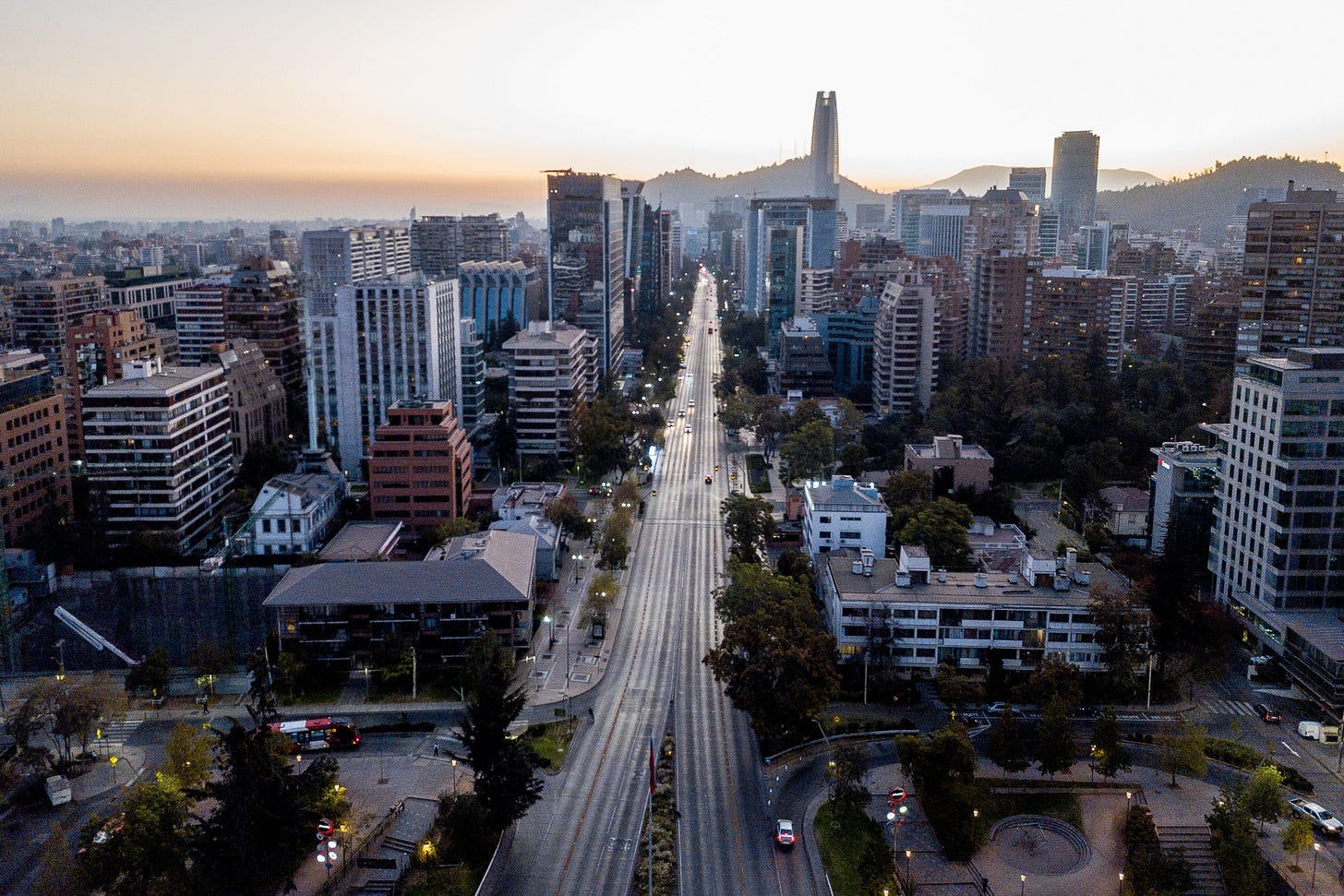Emerging Markets Daily - April 6
Dubai's DEWA $6.1B IPO, India Fastest Growing Major Economy: ADB, Global Trade Falls in March, Chile Constitution Reform Falters, Nigeria Banks vs. Fintech Rivals
The Top 5 Stories Shaping Emerging Markets from Global Media - April 6
Dubai’s DEWA Raises $6.1 Billion in Biggest EMEA IPO Since 2019
“DEWA’s IPO is the biggest in Europe, the Middle East or Africa since Saudi Arabian oil giant Aramco raised almost $30 billion in late 2019. It’s also the largest globally since South Korea’s LG Energy Solution raised $10.8 billion in January.”
Bloomberg
“Dubai’s main power and water company raised $6.1 billion in the world’s second-biggest initial public offering this year, defying a global slowdown in listings.
“The government sold 9 billion shares in Dubai Electricity & Water Authority at 2.48 dirhams each, the top end of the range. That gives it a market value of $33.8 billion and makes it one of the world’s biggest utilities. The stock is expected to start trading in Dubai on April 12.”
“DEWA almost tripled the stake it sold to 18% after initially setting out to list 6.5%. It is highly unusual for companies to increase the size of IPOs to that extent. It’s the latest sign of feverish appetite for share offerings in the Persian Gulf even as deals dry up in the rest of the world.”
“Orders totaled almost $86 billion, according to the Dubai government, continuing a trend whereby Gulf IPOs have attracted tens of billions of dollars of demand from investors. Excluding cornerstone and strategic investors, the orderbook was 37 times oversubscribed.”
“Russia’s invasion of Ukraine, rising inflation and hawkish central bank policies have roiled equity markets worldwide, causing several listings to be scuppered. But high oil prices have benefited the energy-rich Gulf, leading to strong investor inflows.”
“DEWA’s IPO is the biggest in Europe, the Middle East or Africa since Saudi Arabian oil giant Aramco raised almost $30 billion in late 2019. It’s also the largest globally since South Korea’s LG Energy Solution raised $10.8 billion in January.”
“The deal marks a turnaround for Dubai, which missed out entirely on a boom that swept the Gulf last year. The emirate had seen just one $95 million listing since 2017.”
“Dubai is trying to reinvigorate its capital markets and boost sagging trading volumes to catch up with rivals Abu Dhabi and Riyadh. The government plans to list 10 state companies, of which DEWA is the first.”
“The utility caters to Dubai’s roughly 3.5 million residents. It has 13.4 gigawatts of power capacity and runs desalination plants. It made adjusted earnings before interest, tax, depreciation and amortization of $3.3 billion last year. Its net debt at the end of 2021 was $4.8 billion.” Bloomberg reports.
India to Grow 7.5% in FY ‘23, Remains Fastest Growing Major Economy: ADB
The Times of India
“India is likely to maintain its position as the fastest-growing major economy with the ADB outlook projecting a growth rate of 7.5 per cent for 2022-23 on strong investment prospects against 5 per cent for China in January-December 2022.”
“The Asian Development Bank (ADB) Outlook 2022 said that India's growth in the next fiscal year 2023-24 will accelerate further to 8 per cent, though China will witness a deceleration in growth to 4.8 per cent in 2023.”
“The ADB, however, flagged inflation as a major issue mainly on account of a rise in prices of commodities in wake of the ongoing Russia Ukraine war.”
“In its India Chapter, ADB said: ‘GDP is forecast to grow by 7.5 per cent in FY2022 (fiscal to be ending in March 2023) and 8 per cent in FY2023 (to be ending in March 2024), driven by strong investment growth, with public investment helping crowd-in private investment.’” The Times of India reports.
Global Trade Falls 2.8% in March Amid Russia-Ukraine War Fall-Out
Financial Times
“The value of global trade fell 2.8 per cent between February and March as Russia’s invasion of Ukraine led to a sharp drop in container ship traffic from the two countries, according to the Kiel Institute for the World Economy.”
“The data from the German research body are the first to indicate how much the conflict in Ukraine and extensive sanctions imposed on Russia by the west have hit global trade since the invasion started on February 24.”
“The biggest impact was on trade with Russia, as the value of imports into the country fell 9.7 per cent in March from the previous month, while exports fell 5 per cent, according to the Kiel Institute. Its indicator tracks shipping data from 500 ports in real time, seasonally adjusting the value of exports and imports, to offer a measure of trading activity.”
“…The figures tie in with separate data compiled monthly by JPMorgan and rating company S&P, which showed the global exports purchasing managers’ index dropping to 48 in March, down from 51 the previous month and the lowest since July 2020, when many countries had stringent coronavirus restrictions in place. This was also below the 50 mark, which indicates a majority of businesses reporting a contraction in exports compared with the previous month.” The FT reports.
Chile’s Bid to Replace Pinochet-Era Constitution at Risk of Failure
Reuters
“Javier Alonso, a Chilean telecoms worker, voted in 2020 in favor of a landmark plan to replace the country's constitution that dates from the era of former dictator Augusto Pinochet. Now his support is wavering.”
“Opinion polls this week showed for the first time that more Chileans would reject the new text than approve it, as it looks increasingly possible that it will fail in a national yes-no vote planned for September.”
“That would be a blow for its architects and supporters – including progressive new President Gabriel Boric – who hope it will underpin major economic and social reforms.”
“Many critics have argued that the current 1980 text is illegitimate due to its dictatorship origins that they say give right-wing parties an unfair boost and underpin deep economic inequality.”
“A referendum two years ago to replace the constitution won huge support after months of violent protests in 2019 against inequality, and an assembly was chosen to draft the new text.”
“But political squabbling within the assembly and a raft of proposals on areas from pensions to reforming Congress that are more radical than many Chileans had bet on has thrown the future of the new constitution into doubt.”
“If the new text is rejected then the Pinochet-era version would remain in place, a major setback for the 36-year-old Boric, who took office last month pledging a social and economic overhaul.”
“Some proposals have already failed dramatically. The commission in charge of designing the political framework saw 93 of its 96 proposals voted down by the assembly in March, including a proposal for a unicameral congress.” Reuters reports.
Nigerian Banks Face Survival of the Fittest in the FinTech Era
African Business
“These are not the best of times for Nigerian banks. Caught between the attrition of fintech companies nibbling away at market share and the muscle of the latest entrants to the financial system – mobile-phone companies – they are forced to contemplate the portents of a fast-changing industry.”
“Measures by the Central Bank of Nigeria (CBN) to bring more people into the financial system have boosted the growth of fintech companies offering everything from digital banking to payments, investments and wealth management services.”
“Popular names such as Cowrywise, Flutterwave, Paystack, Risevest, Renmoney, Bamboo, Fundall, Carbon, Zedvance and Page Financials have joined more established players such as Quickteller, eTranzact and Paga.”
“With the recent payment-service banking licences issued to MTN Nigeria and Airtel Africa, the two leading mobile phone companies in the country, all the four phone networks active in Nigeria are now set to provide some banking services, further roiling the financial services sector.”
“…Yet, the changes in the industry are already being felt. Several of the biggest established banks, including Guaranty Trust Bank, Stanbic IBTC and First Bank, reported significant profit declines in 2021. Reports from the boardrooms indicate concerns about fintechs taking up significant market share.” Dulue Mbachu reports.
“Everything is a risk. Not doing anything is a risk. It's up to you.” - Nicola Yoon.






